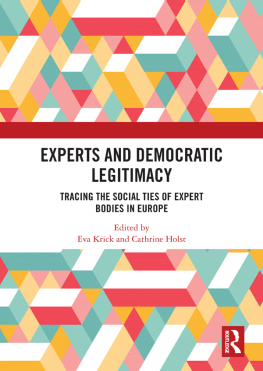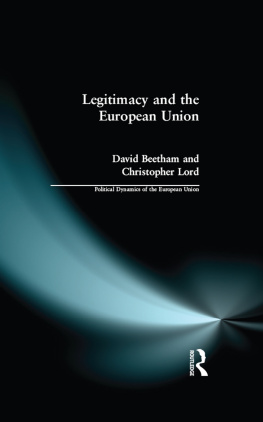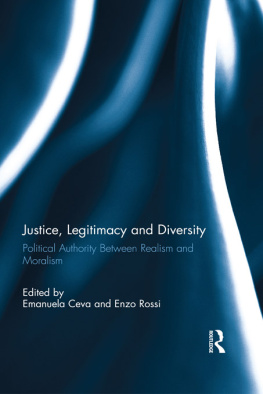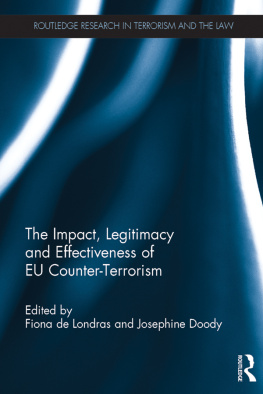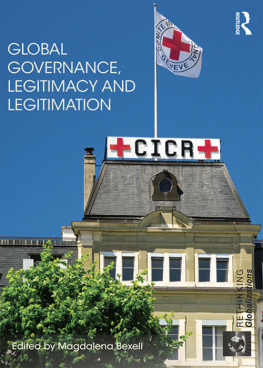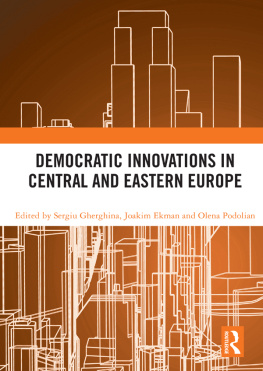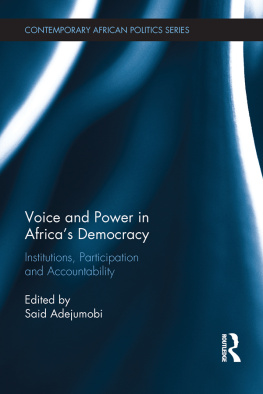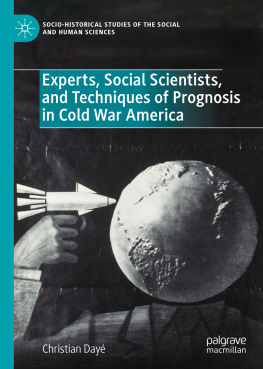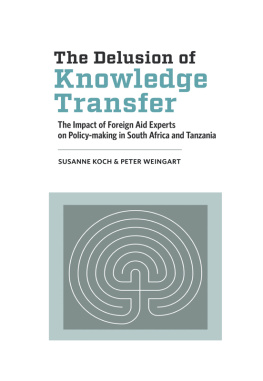Experts and Democratic Legitimacy
Experts and Democratic Legitimacy challenges the technocratic reading of expert bodies, such as central banks, advisory committees and regulatory agencies.
In this book, expert contributors ask in what way expert bodies are subject to some of the key pressures in contemporary governance, such as democratisation, politicisation and expertisation. Based on empirical studies, the book traces the multiple social ties of expert bodies and refines the common perception of expert bodies as de-politicised institutions that are detached from political interference and societal input. It further theorises the tension and reconcilability between reliable, independent expert knowledge, on the one hand, and the need for accountability and legitimacy in modern policy-making, on the other hand.
Refining the detached, de-politicised image of non-majoritarian institutions, Experts and Democratic Legitimacy will be of great interest to scholars of European studies, political and social theory, modern governance and policy-making.
This book was originally published as a special issue of European Politics and Society.
Eva Krick is a Postdoctoral Research Fellow at ARENA Centre for European Studies at the University of Oslo, Norway. Her research focuses on European consensus democracies, on coordination and negotiation as modes of collective decision-making on and the relationship of expert knowledge and democratic legitimacy in modern governance.
Cathrine Holst is a Professor in the Department of Sociology and Human Geography, and a researcher at ARENA Centre for European Studies at the University of Oslo, Norway. Her work focuses inter alia on political and social theory, on the role of experts in policy-making and on gender policy in Europe.
Experts and Democratic
Legitimacy
Tracing the Social Ties of Expert Bodies in Europe
Edited by
Eva Krick and Cathrine Holst
First published 2020
by Routledge
2 Park Square, Milton Park, Abingdon, Oxon, OX14 4RN
and by Routledge
52 Vanderbilt Avenue, New York, NY 10017
Routledge is an imprint of the Taylor & Francis Group, an informa business
Chapters 13, 5, 7 2020 Taylor & Francis
Chapter 4 2018 Johan Christensen and Kathia Serrano Velarde. Originally published as Open Access.
Chapter 6 2018 Johan Christensen and Stine Hesstvedt. Originally published as Open Access.
Chapter 8 2018 Bo Rothstein. Originally published as Open Access.
With the exception of , please see the chapters Open Access footnotes.
Trademark notice: Product or corporate names may be trademarks or registered trademarks, and are used only for identification and explanation without intent to infringe.
British Library Cataloguing-in-Publication Data
A catalogue record for this book is available from the British Library
ISBN13: 978-0-367-42753-5
Typeset in Myriad Pro
by codeMantra
Publishers Note
The publisher accepts responsibility for any inconsistencies that may have arisen during the conversion of this book from journal articles to book chapters, namely the inclusion of journal terminology.
Disclaimer
Every effort has been made to contact copyright holders for their permission to reprint material in this book. The publishers would be grateful to hear from any copyright holder who is not here acknowledged and will undertake to rectify any errors or omissions in future editions of this book.
Contents
Eva Krick and Cathrine Holst
Claudia Landwehr and Matthew Wood
Eva Krick
Johan Christensen and Kathia Serrano Velarde
Christopher Lord
Johan Christensen and Stine Hesstvedt
Guri Rosn and Silje H. Trnblad
Bo Rothstein
The chapters in this book were originally published in European Politics and Society, volume 20, issue 1 (2019). When citing this material, please use the original page numbering for each article, as follows:
Chapter 1
The socio-political ties of expert bodies. How to reconcile the independence requirement of reliable expertise and the responsiveness requirement of democratic governance
Eva Krick and Cathrine Holst
European Politics and Society, volume 20, issue 1 (2019) pp. 117131
Chapter 2
Reconciling credibility and accountability: how expert bodies achieve credibility through accountability processes
Claudia Landwehr and Matthew Wood
European Politics and Society, volume 20, issue 1 (2019) pp. 6682
Chapter 3
Creating participatory expert bodies. How the targeted selection of policy advisers can bridge the epistemic-democratic divide
Eva Krick
European Politics and Society, volume 20, issue 1 (2019) pp. 101116
Chapter 4
The role of advisory bodies in the emergence of cross-cutting policy issues: comparing innovation policy in Norway and Germany
Johan Christensen and Kathia Serrano Velarde
European Politics and Society, volume 20, issue 1 (2019) pp. 4965
Chapter 5
No epistocracy without representation? The case of the European Central Bank
Christopher Lord
European Politics and Society, volume 20, issue 1 (2019) pp. 115
Chapter 6
Expertisation or greater representation? Evidence from Norwegian advisory commissions
Johan Christensen and Stine Hesstvedt
European Politics and Society, volume 20, issue 1 (2019) pp. 83100
Chapter 7
How does expert knowledge travel between EU institutions? The case of the Transatlantic Trade and Investment Partnership
Guri Rosn and Silje H. Trnblad
European Politics and Society, volume 20, issue 1 (2019) pp. 3248
Chapter 8
Epistemic democracy and the quality of government
Bo Rothstein
European Politics and Society, volume 20, issue 1 (2019) pp. 1631
For any permission-related enquiries please visit:
http://www.tandfonline.com/page/help/permissions
Johan Christensen is an Assistant Professor at the Institute of Public Administration at Leiden University, The Hague, the Netherlands.
Stine Hesstvedt is a Doctoral Research Fellow at ARENA Centre for European Studies at the University of Oslo, Norway.
Cathrine Holst is a Professor in the Department of Sociology and Human Geography, and a researcher at ARENA Centre for European Studies at the University of Oslo, Norway.
Eva Krick is a Postdoctoral Research Fellow at ARENA Centre for European Studies at the University of Oslo, Norway.
Claudia Landwehr is a Professor of Public Policy (Politics and Economy) at Johannes Gutenberg University Mainz, Germany.
Christopher Lord is a Professor at ARENA Centre for European Studies at the University of Oslo, Norway.
Guri Rosn is an Associate Professor of Public Administration and Governance at OsloMet, Norway.
Bo Rothstein is a Professor and holds the August Rhss Chair in Political Science at the University of Gothenburg, Sweden.

